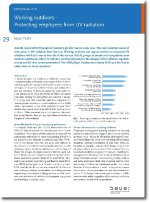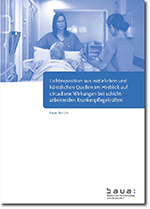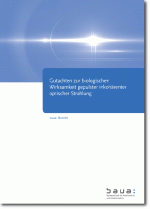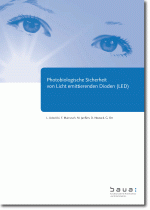Optical radiation may endanger the skin and eyes of employees
Optical radiation includes the ultraviolet (UV), visible (VIS, light), and infrared (IR) wavelength ranges of the electromagnetic spectrum. People working with this radiation may endanger their health. BAuA searches for ways of avoiding this.

Besides the sun as a natural source of radiation, there are numerous artificial sources emitting optical radiation in today's world of work. In this, a differentiation must be made between coherent radiation of a laser and incoherent radiation of LEDs, lamps, or spotlights, but also from plasma light arcs, for example. The commercial use of optical radiation includes material processing, e.g. using lasers, stage machinery as well as medical applications, such as the removal of tattoos. However, the targeted use of optical radiation is common in the private area as well. The use of laser pointers during speeches is only one of many examples.

However, this non-ionising radiation may endanger the skin and the eyes. A differentiation is being made between acute damage, such as sunburn or photo-keratitis, and long-term damage, such as skin cancer and cataract.
The Ordinance on Industrial Health and Safety regarding Artificial Optical Radiation (OStrV) forms the statutory framework for optical radiation. It was implemented nationally in 2010 based on the European Directive on Artificial Optical Radiation (2006/25/EC)
BAuA develops methods for profound risk assessment
The objective of the Federal Institute for Occupational Safety and Health (BAuA) is, among others, a safe design of working conditions where optical radiation is being used or where this radiation occurs as an undesired by-product. In order to allow for a profound risk assessment of such workstations, BAuA does not only manage the know-how, but performs its own R&D projects or awards these to third parties.
The transfer of newly gained findings to the public is manifold. In this, publishing research reports is a part of it, as is the establishing of rules. The distribution of research results may cover a correspondingly large area:
- new-creation and implementation of national and European regulations and provisions
- development of guidelines and information for employers and employees
- information for manufacturers regarding the development of safe and health-compliantly designed products
- help for market surveillance agencies




